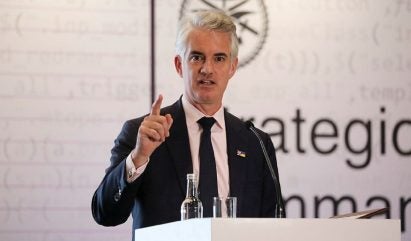
In a Parliament Defence Committee hearing discussing Britain’s future aviation capabilities on 21 February, 2024, the UK Minister for Defence Procurement, James Cartlidge, stressed that it is “militarily crucial” to deliver the Global Combat Air Programme (GCAP) by 2035.
GCAP is a trilateral alliance in which Italy, Japan and the UK will jointly develop a sixth generation combat aircraft. This arrangement was codified in a legal framework set up in December 2023.
With the goal of bringing the future fighter into service by 2035, the alliance intends for the platform to replace their ageing combat aircraft approaching the end of their life-cycle. These include the 20-year-old Eurofighter Typhoons, the even older AMX A-11 Ghibli, as well as the Mitsubishi F-2.
In the current security climate militaries around the world are prioritising the delivery of platforms more than ever before in order to be able to field platforms and systems as soon as possible.
Cartlidge reiterated this reality, arguing that “2035 is a really crucial target date to get [GCAP] into service… [we] would not want any variation to occur in structure or approach which puts that at risk, let’s be absolutely clear.”
GCAP partners versus customers
One important implication of this statement is that the Minister discouraged other countries from joining the GCAP programme as a potential partner.

US Tariffs are shifting - will you react or anticipate?
Don’t let policy changes catch you off guard. Stay proactive with real-time data and expert analysis.
By GlobalDataHaving already formalised a legally binding treaty, more partners would risk delays as the GCAP International Government Organisation (GIGO) would need to reassert respective, national requirements for the aircraft.
“I think the crucial point,” Cartlidge noted, “is that this is a trilateral partnership, whatever we did with another country in terms of them partnering would require the support of all three countries. But, equally, from the beginning we’ve all been very clear that exportability is very important to this programme.”
Ensuring military readiness is key and Cartlidge is rightly wary of any restructuring that may hold back any progress.
This is a pivotal lesson learned from previous combat air programmes, such as Eurofighter, F-16 and F-35, where there was a persistent problem with agility and decision-making to deliver the aircraft as originally intended.
There is a real need for GCAP, “it is not a luxury,” he said. “If we want to remain competitive militarily, we will have to be developing this capability and the Japanese have their threat, they also have their fighter which is the F-2 coming out of service, we all have those challenges, with the Typhoon etc., so there is a total focus on this.”



